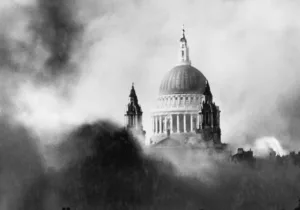A wonderful picture showed eight European monarchs at Queen Elizabeth’s funeral. Many of these royal families sheltered with Elizabeth’s parents during WWII. Norwegian King Harald V’s grandfather & father directed Norwegian resistance from London. Harald and his mother were in Washington, DC, often at the White House, and they stood with FDR on the White House balcony during his momentous fourth inauguration.
These royal families were important symbols during dire times. John Lukacs, the Hungarian-American historian and Catholic, recalled the despair he felt in Hungary as a youth, living first under the Germans, and later under the Soviets. He longingly looked to what he called the Protestant “bourgeois” democratic monarchies of northwest Europe, “nations of families, presided over by royal families, by decent and unpretentious ones,” who were a “central cluster of decency,” while the rest of Europe fell to chaos and evil.
Lukacs wrote of 1940, with Europe under Hitler, and Protestant “bourgeois” Britain stood alone:
Four times in six weeks King George and his queen had driven in the evening to Victoria Station, to greet the fleeing monarchs and presidents of Europe with dignity, sympathy, and solicitude. The German air attacks had not yet begun, and the sky was enormously blue in London, unlike those black clouds that had risen from the fires of Bergen, Rotterdam, Antwerp. In the white rooms of London hotels these royal persons of Europe were surrounded by gentleness and courtesy, by the fading flowers of a civilization. They had come to be thus received in its then last island house.
In that last island house, King George’s daughter Princess Elizabeth was royal heir. Many children, especially of aristocrats, were leaving for North America, or at least the British countryside. Elizabeth’s mother had declared that her children would not leave London without her, that she would never leave without the King, and the King was not leaving. On October 13, 1940, at age 14, the princess gave her first radio address to her country and the world, speaking specifically to Britain’s children, as they prepared for a German onslaught. She concluded her address:
We know, everyone of us, that in the end all will be well; for God will care for us and give us victory and peace. And when peace comes, remember it will be for us, the children of today, to make the world of tomorrow a better and happier place.
Here were the major themes animating Elizabeth for the next 82 years, especially her 70 years as queen: hope, trust in God, commitment to improving her country and the world. She would, as her parents before her, especially during the war, embody the decency, stability, restraint, liberty, law and temperance of British civilization, to which America is heir.
John Lukacs appreciated from his position in occupied Europe what few Americans can. Decency, stability, restraint, liberty, law and temperance among governments and societies are often more anomalies than norms. Britain has a more than 1000 year old monarchy. Its last civil war was over 370 years ago. A monarch was last ejected in 1688, and relatively peacefully. For over three centuries Britain has enjoyed continuous civilian constitutional monarchy, with peaceful transfers of power between governments, growing franchise, rights and liberties, undergird by tradition and nearly universal respect for law. Its democratic principles have emanated throughout the world through its empire. Its former colonies such as America, Canada, Australia, New Zealand, among others, are blessed heirs to its stable democratic constitutional traditions. India, with all its contemporary flaws, is the world’s most populous democracy, thanks to inheriting British institutions. The global Anglosphere, animated by originally Protestant assumptions about governance and liberty, is the chief democratic bloc in the world and chief adversary to aspiring global hegemons like China and Russia.
While America since World War II is the Anglosphere’s leader, Britain and its monarchy remain its stalwart parent. And Queen Elizabeth for seventy years has been the global icon of British originated liberty and law. She had little direct political power. But she reigned with might through her dignity, consistency, and fidelity to her ancient vocation. She was the chief representative of the West during the Cold War. And during subsequent conflicts she faithfully embodied the best of the West and of Anglo-American partnership.
Earlier this year, a snarly Russian commentator on Putin-controlled television, raged against British support for Ukraine, deriding its “moss-covered” queen. Russia, like Britain, is old. But its despotic government is too new, flimsy, and arbitrary to have gained the dignity and gravitas of patina and moss. Elizabeth, even when quiet, as she usually was, was more respected and globally influential than Putin or any other tinhorn dictator. She represented, in her very person, a millennium of ordered civilization that has developed one of humanity’s most decent and enduring political systems.
Elizabeth incarnated Anglo Protestant constitutional bourgeois democracy, which began on a small island centuries ago and now encompasses hundreds of millions of all races, cultures and religions. In her 70 years she helped universalize and solidify her culture’s best particulars. She upheld a central cluster of decency amid our world’s many horrors and dangers, for which thank God.






